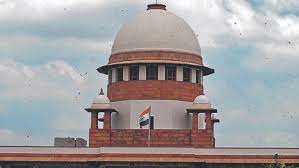Under Section 376D, 384, 506 of the Indian Penal Code (for short ‘the IPC’), Section 326 of POCSO Act and Section 3(2)(v) of The Scheduled Castes and Scheduled Tribes (Prevention of Atrocities) Act, 1989 (for short SC/ST Act) and Section 66 of the Information Technology Act, 2000. (Para 2)
It is the case of the prosecution that minor girl “XXX” aged 15 years and six months was studying in Class-X had got acquainted with a boy named Vivek and he seduced the minor girl and took her to Samleti Palace Hotel, Mandawar Road, Mahwa on February 24, 2021 and he along with his friends Deepak and Netram gang raped her after drugging and took videos of the incident. It was alleged that all of them had threatened her not to disclose the said incident as otherwise they would eliminate her father and brother make the video viral. (Para 4)
It was also alleged that on 2nd May, 2021 the marriage of his elder brother’s daughter took place and entire family was busy and at that point of time they forced the minor girl to permit Vivek and his companions to enter the house by putting pressure on her and the jewellery kept for the marriage was taken away by Vivek and his accomplice. (Para 4)
It is also pertinent to note at this juncture that order taking cognizance by the jurisdictional court against Deepak was challenged before the High Court which came to be dismissed and same was challenged before this Court and later withdraw the petition. (Para 5)
High Court granted the relief in their favour and enlarged them on bail after taking into consideration the statement of the prosecutrix (victim) recorded during the course of trial and by taking into consideration the possibility of time being consumed for trial. The complainant being aggrieved by the grant of bail has preferred these appeals by special leave. (Para 6)
No doubt each case would have unique facts peculiar to its own and the same would hold key for adjudication of bail matters including cancellation thereof. There may be circumstances where interference to or attempt to interfere with the course of administration of justice or evasion or attempt to evade to due course of justice are abuse of concession granted to the accused in any manner. (Para 16)
The offence alleged in the instant case is heinous and would be a onslaught on the dignity of the womanhood and the age old principle of “non English text omitted” (where women are respected Gods live there) would recede to the background and the guilty not being punished by process of law or accused persons are allowed to move around freely in the society or in spite of there being prima facie material being present they are allowed to move around freely in the society before guilt is proved and are likely to indulge in either threatening the prosecution witnesses or inducing them in any manner to jettison the criminal justice system, then the superior court will have to necessarily step in to undo the damage occasioned due to erroneous orders being passed by courts below. (Para 17)
The Courts have placed the liberty of an individual at a high pedestal and extended the protection to such rights whenever and wherever required. In the same breadth, it requires to be noticed that emphasis has also been laid on furnishing reasons for granting while balancing it with the requirement of a fair trial bail even though such reasoning may be brief. (Para 26)
In the aforesaid circumstances, we notice that the impugned order granting bail is not only bereft of material particulars which would justify grant of bail, but it seems that the High Court has got swayed on the ground of delay and the video having not been recovered during the course of investigation and has given a complete go by to the allegation made in the FIR and statement recorded under Section 161 and 164 of the Cr.P.C. as also the testimony of the prosecutrix before the jurisdictional court. (Para 27)
2023 STPL(Web) 206 SC
[2023 INSC 761]
SUPREME COURT OF INDIA
Bhagwan Singh Vs. Dilip Kumar @ Deepu @ Depak And Another
Criminal Appeal No. 2560 of 2023 (@ Special Leave Petition (Crl.) No.6199 of 2023) With Criminal Appeal No. of 2023 (@ Special Leave Petition (Crl.) No.6200 of 2023)-Decided on 23-8-2023
https://stpllaw.in/wp-content/uploads/2023/08/2023-STPLWeb-206-SC.pdf







